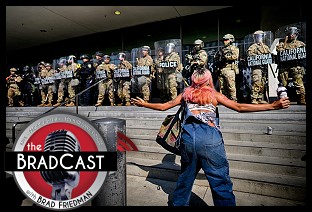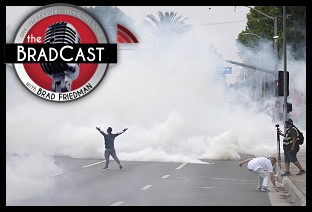Guest Blogged by Joseph Cannon
 A long predicted constitutional battle has finally begun. The judiciary committees of both the House and the Senate have subpoenaed administration documents pertinent to the U.S. attorney scandal. In a letter of response, White House counsel Fred Fielding has declined to cooperate, invoking executive privilege.
A long predicted constitutional battle has finally begun. The judiciary committees of both the House and the Senate have subpoenaed administration documents pertinent to the U.S. attorney scandal. In a letter of response, White House counsel Fred Fielding has declined to cooperate, invoking executive privilege.
The judiciary committees have, in a separate action, also subpoenaed documents relating to the warrantless wiretapping controversy. The White House is again expected to invoke executive privilege.
Congressman John Conyers has fired back at the White House attorney...
As Marcy Wheeler points out, the Fielding letter relies on an opinion written by Solicitor General Paul Clement. Clement, however, heads the Office of Special Counsel's investigation into the Attorney firings.
The result is a classic case of a fox guarding the henhouse:
Moreover, the Clement opinion makes an astonishing admission about the firing of those U.S. Attorneys, the matter underlying those subpoenas. Here's what Clement wrote:
In other words, Clement buttresses his claim of executive privilege by admitting that which Republicans have long denied --- that the White House was involved in the firings and the choice of replacements. Previously, Bush has insisted that “the Justice Department made recommendations, which the White House accepted."
Republican Congressman Chris Cannon of Utah seems oddly unfamiliar with the admission in Clement's opinion:
Clement has taken the matter out of speculation. If there was no White House involvement, why invoke executive privilege?
Since Clement obviously cannot both investigate and defend the Bush administration, many now call for a special prosecutor.
Fielding's response forces the country to confront one key question: What happens when a person, group or branch of government defies a congressional subpoena?
Congress can issue a citation of contempt. However, 2 U.S.C. § 194 states that such a citation must be referred to the U.S. Attorney in Washington D.C. --- a position held at this time by Jeffrey Taylor, a close confidant of Alberto Gonzales. Only Taylor can convene a Grand Jury to prosecute the offense.
Thus, the paradox: The underlying issue in this matter involves politicization of the U.S. Attorneys. And yet Congress must now rely on a U.S. Attorney to uphold a citation of contempt against the administration. Many believe that Taylor is a product of the politicization which is at the heart of this matter.
White House refusal to honor subpoenas may constitute grounds for impeachment of both Bush and Cheney. In 1970, Gerald Ford (then a House member from Michigan) said that “An impeachable offense is whatever the majority of the House of Representatives considers it to be at any given moment in its history.” Only the impeachment route would bypass the need to rely on Bush/Cheney loyalists such as Taylor and Clement.


 Sunday 'Total Obliteration' Toons
Sunday 'Total Obliteration' Toons Thank You For Your Attention to This Matter:
Thank You For Your Attention to This Matter: 'Green News Report' 6/26/25
'Green News Report' 6/26/25
 Mamdani Primary 'Win' Augurs New Generation of Progressives Rising: 'BradCast' 6/25/25
Mamdani Primary 'Win' Augurs New Generation of Progressives Rising: 'BradCast' 6/25/25 U.S. Authoritarianism Under-way (But We're Still Here to Fight It): 'BradCast' 6/24/25
U.S. Authoritarianism Under-way (But We're Still Here to Fight It): 'BradCast' 6/24/25 'Green News Report' 6/24/25
'Green News Report' 6/24/25 'Anti-War' Trump Attacks a Mid-East Nation on False Claims About WMD: 'BradCast' 6/23/25
'Anti-War' Trump Attacks a Mid-East Nation on False Claims About WMD: 'BradCast' 6/23/25  Sunday 'Peacemaker' Toons
Sunday 'Peacemaker' Toons Senate Health Care Cuts 'More Extreme' Than House Version: 'BradCast' 6/19/25
Senate Health Care Cuts 'More Extreme' Than House Version: 'BradCast' 6/19/25 'Green News Report' 6/19/25
'Green News Report' 6/19/25 What 'Anti-War President'? MAGA Civil War Over Trump, Iran: 'BradCast' 6/18/25
What 'Anti-War President'? MAGA Civil War Over Trump, Iran: 'BradCast' 6/18/25 Trump Calls for 'Remigration', a Codeword for 'Ethnic Cleansing': 'BradCast' 6/17/25
Trump Calls for 'Remigration', a Codeword for 'Ethnic Cleansing': 'BradCast' 6/17/25 'Green News Report' 6/17/25
'Green News Report' 6/17/25 Last Weekend Today: 'BradCast' 6/16/25
Last Weekend Today: 'BradCast' 6/16/25 Sunday 'Despot Times, Despot Measures' Toons
Sunday 'Despot Times, Despot Measures' Toons Then They Came for the U.S. Senators: 'BradCast' 6/12/25
Then They Came for the U.S. Senators: 'BradCast' 6/12/25 'Green News Report' 6/12/25
'Green News Report' 6/12/25 Lawless Trump Warms Up for Insurrection Act: 'BradCast' 6/11/25
Lawless Trump Warms Up for Insurrection Act: 'BradCast' 6/11/25 Trump Inciting Violence, State of Fear in L.A., Elsewhere: 'BradCast' 6/10/25
Trump Inciting Violence, State of Fear in L.A., Elsewhere: 'BradCast' 6/10/25 Nevermind Elon and Epstein Files, Trump Declares L.A. 'Riots'!: 'BradCast' 6/9/25
Nevermind Elon and Epstein Files, Trump Declares L.A. 'Riots'!: 'BradCast' 6/9/25 'Jesus Weeps' at Trump's
'Jesus Weeps' at Trump's 300k 'Preventable' Deaths Since Trump USAID Shutdown: 'BradCast' 6/4/25
300k 'Preventable' Deaths Since Trump USAID Shutdown: 'BradCast' 6/4/25 Storm Warnings: 'BradCast' 6/3/25
Storm Warnings: 'BradCast' 6/3/25 SCOTUS Ignores Own Precedents In Recent 'Emergency' Rulings: 'BradCast' 6/2/25
SCOTUS Ignores Own Precedents In Recent 'Emergency' Rulings: 'BradCast' 6/2/25 'A World of Tyrants, Bribes, and Influence': 'BradCast' 5/22/25
'A World of Tyrants, Bribes, and Influence': 'BradCast' 5/22/25
 VA GOP VOTER REG FRAUDSTER OFF HOOK
VA GOP VOTER REG FRAUDSTER OFF HOOK Criminal GOP Voter Registration Fraud Probe Expanding in VA
Criminal GOP Voter Registration Fraud Probe Expanding in VA DOJ PROBE SOUGHT AFTER VA ARREST
DOJ PROBE SOUGHT AFTER VA ARREST Arrest in VA: GOP Voter Reg Scandal Widens
Arrest in VA: GOP Voter Reg Scandal Widens ALL TOGETHER: ROVE, SPROUL, KOCHS, RNC
ALL TOGETHER: ROVE, SPROUL, KOCHS, RNC LATimes: RNC's 'Fired' Sproul Working for Repubs in 'as Many as 30 States'
LATimes: RNC's 'Fired' Sproul Working for Repubs in 'as Many as 30 States' 'Fired' Sproul Group 'Cloned', Still Working for Republicans in At Least 10 States
'Fired' Sproul Group 'Cloned', Still Working for Republicans in At Least 10 States FINALLY: FOX ON GOP REG FRAUD SCANDAL
FINALLY: FOX ON GOP REG FRAUD SCANDAL COLORADO FOLLOWS FLORIDA WITH GOP CRIMINAL INVESTIGATION
COLORADO FOLLOWS FLORIDA WITH GOP CRIMINAL INVESTIGATION CRIMINAL PROBE LAUNCHED INTO GOP VOTER REGISTRATION FRAUD SCANDAL IN FL
CRIMINAL PROBE LAUNCHED INTO GOP VOTER REGISTRATION FRAUD SCANDAL IN FL Brad Breaks PA Photo ID & GOP Registration Fraud Scandal News on Hartmann TV
Brad Breaks PA Photo ID & GOP Registration Fraud Scandal News on Hartmann TV  CAUGHT ON TAPE: COORDINATED NATIONWIDE GOP VOTER REG SCAM
CAUGHT ON TAPE: COORDINATED NATIONWIDE GOP VOTER REG SCAM CRIMINAL ELECTION FRAUD COMPLAINT FILED AGAINST GOP 'FRAUD' FIRM
CRIMINAL ELECTION FRAUD COMPLAINT FILED AGAINST GOP 'FRAUD' FIRM RICK SCOTT GETS ROLLED IN GOP REGISTRATION FRAUD SCANDAL
RICK SCOTT GETS ROLLED IN GOP REGISTRATION FRAUD SCANDAL VIDEO: Brad Breaks GOP Reg Fraud Scandal on Hartmann TV
VIDEO: Brad Breaks GOP Reg Fraud Scandal on Hartmann TV RNC FIRES NATIONAL VOTER REGISTRATION FIRM FOR FRAUD
RNC FIRES NATIONAL VOTER REGISTRATION FIRM FOR FRAUD EXCLUSIVE: Intvw w/ FL Official Who First Discovered GOP Reg Fraud
EXCLUSIVE: Intvw w/ FL Official Who First Discovered GOP Reg Fraud GOP REGISTRATION FRAUD FOUND IN FL
GOP REGISTRATION FRAUD FOUND IN FL

































